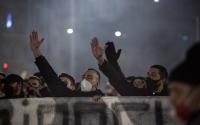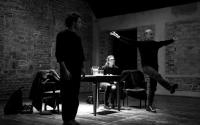2 January 2008David Servenay
Gross electoral fraud has provoked the violence between President Kibaki's partisans and those of Odinga."Inter-ethnic war," "machete massacres" ... the usual commonplaces about Africa have rapidly reappeared, while the riots' death toll in Kenya grows. Nonetheless, the primary and principal source of the anger in the street is massive electoral fraud in a country revolted by those practices. Fraud to such an extent that the president of the Electoral Commission got to the point of declaring to The Standard this Wednesday: "I don't know whether Kibaki won the election."
Initially, a Classic Vote Between Two Political Heavyweights
Last week, the Kenyan presidential election interested no one. Stuck between Christmas and New Year's, no one detected the least risk to democracy. Yet never since the country's independence in 1963 had the outcome of an election been so open.
Face-off: The challenger, Raila Amolo Odinga, 62 years old, son of Jaramogi Odinga, Father of Independence Jomo Kenyatta's former vice president. Former energy minister, then roads, public works and housing minister, he forged a profile as a tenacious opponent.
Imprisoned without trial for six years (1982-88) in Daniel Arap Mo•'s jails, he founded the Orange Democratic Movement (ODM), a war machine to beat the incumbent. With its arsenal of modern communications: an Internet site, groups on Facebook, Myspace ...
The incumbent, Mwai Kibaki, 76 years old, who aspires to a second five-year term, is the son of Kikuyu peasants with a degree in economics from the University of Kampala (Uganda). He entered political life in 1963, when he was elected to Parliament. Starting in 1978, he joined the reign of Daniel Arap Mo• as vice president, then as minister of the interior and health minister.
He spent time in the opposition during the nineties, before making a comeback in 2002 as leader of the National Rainbow Coalition, and won the presidential election with 62 percent of the votes. Father of four children, he has a reputation for not being a hard worker.
Strong Turnout Under the Eyes of 30,000 Observers
Thursday, December 27, Kenyans went to the polling places for a triple election. They had to designate their new president of the Republic, but also the 210 elected members of Parliament and 2,484 local elected officials. Calm prevailed during the voting, mostly: two died and a voting agent was wounded. The 14 million registered voters came to the polls in massive numbers, as long waiting lines in front of voting stations testified. All under the eyes of 30,000 observers.
The Constitution makes provision that the candidate who has received 25 percent of the votes cast in at least five of the country's eight provinces is declared victor, as long as he is also elected as a deputy. If one of those conditions is not fulfilled, a second round is organized between the candidates leading the first round twenty-one days later. The results were expected the day after the election, Friday.
A Vast Manipulation of Poll Results
Then the tallying of the votes began, along with what today appears as a vast manipulation of the poll results. In the beginning, the Electoral Commission of Kenya (ECK) did not note any irregularities. Expected Friday, the announcement of the results was delayed.
Saturday, the first violent clashes broke out in the West of the country, in Kisumu (Nyanza province), an opposition bastion. Demonstrations, road blocks and the arson of several stores: Odinga's partisans struck out at Kikuyus, suspected of wanting to confiscate power. Identical scenario in the Kibera slum. That time, the police opened fire as it interposed between opposing groups of Luos and Kikuyus.
Swearing-in One Hour After Results Announced
Sunday, everything accelerated. The president of the Electoral Commission, Samuel Kivuitu, announced the final result live on television: Kibaki won with 4,584,721 votes, versus 4,352,993 votes for his rival. Less than an hour after that announcement, Mwa• Kibaki swore the oath of office, still on live television. At the same time, riots broke out all over the country, especially in the West, where Raila Odinga's bastions are located and in the slums of the big cities. The initial death toll was 12.
The opposition's reaction was immediate: the ODM announced its intention of holding a counter-swearing-in ceremony in a Nairobi park the next day, Monday, December 31. The United States, through State Department spokesman Robert McInturff, hailed Kibaki's reelection:
"The United States congratulates the winners and is calling for calm, and for Kenyans to abide by the results declared by the election commission. We support the commission's decision."
The next day, Washington backpedaled in a new State Department statement, but it was too late.... In London, Foreign Office Secretary David Miliband, immediately understood the trap:
"We are truly worried about the irregularities European Union observers and others have documented. We call on all of Kenya's political leaders and democratic institutions to work together to address those concerns."
The same tone as that adopted by European Union observers. Alexander Graf Lambsdorff noted:
"The Electoral Commission of Kenya has not succeeded in establishing the credibility of the tallying process to the satisfaction of all parties and candidates."
Part of the Electoral Commission Uncovers the Mystery
Thanks to a confidential document revealed Tuesday, January 1, by Le Monde, the chicanery became clear in a new light. Everything was staged overnight Saturday during a discreet meeting of representatives from the parties in the running. One by one, all the irregularities were methodically revealed by a participant.
The first lesson: Raila Odinga was ahead by up to a million votes during the tallying, out of a total of eight million votes. Apparently, the count was taking place normally for three-quarters of the ballots. Then, during the last quarter of the tallying, the situation took a strange turn. Out of 210 precincts, 88 were the object of dispute, with anomalies in the official ballot tallying form:
"Either that document had disappeared, or it was not signed, or a later copy, not signed by the competent authorities, was introduced at the last moment, either in the form of a photocopy or a flagrant fake."
In the central province, Kibaki's fief, a polling place where 1,200 voters were registered suddenly saw its ballots pick up a zero. Of the 12,000 voters, a majority chose the outgoing president. In other polling places, it was not unusual to find voter turnout in excess of 100 percent!
Another case in point: the agents charged with bringing the results from a dozen precincts quite simply disappeared. According to certain observers, they preferred to slip away rather than vouch for results that they knew to be totally rigged.
A unique event in the annals of African elections: the results announced were deemed so bogus that four Kenyan members of the Electoral Commission of Kenya convoked a press conference to denounce a manipulation. Since then, audio-visual media have been prohibited, a curfew has been decreed and police have been ordered to fire at demonstrators on sight.






